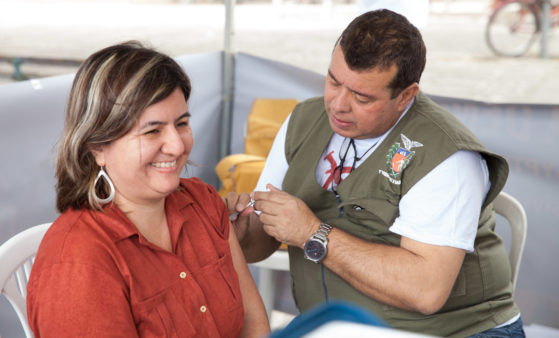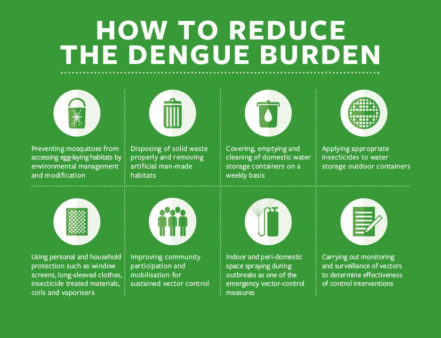- by Gary Finnegan
Paraná State rolls out the final wave of its dengue immunization program

Health authorities in the Paraná State of Brazil are embarking on the third stage of a public dengue immunization program targeting individuals 9-44 years of age, the first public initiative of its kind in the Americas. The community-based vaccination campaign began on September 20 and will run until late-October in 30 municipalities in Paraná where dengue burden has been high, according to the local Secretary of Health.
More than 300,000 people have received the dengue vaccine in the two previous campaigns as part of the public vaccination program that kickstarted the Paraná dengue battle a year ago. With an initial target of 500,000 people, Parana reported a 60% coverage rate for the first dose.
Almost 2.3 million people suffered from dengue in 2016 in Latin America. Dengue, often nick-named ‘break-bone fever,’ can lead to painful disease marked by fever, headache, and lasting malaise. Today, there is no specific treatment for dengue, which can deteriorate unpredictably into severe dengue that can be deadly.
The World Health Organization recommends integrated dengue prevention and management strategies in endemic countries. As part of integrated public health interventions against the disease, the potential value and impact of dengue vaccination are significant. The WHO has recommended that countries with high dengue burdens consider vaccine introduction.
The first and only vaccine against the four dengue serotypes came into the world in 2015, being registered in Mexico, the country with one of the highest number of cases in the Americas. The vaccine has been approved in 19 countries around the world and is now available in seven Latin American nations: Brazil, Costa Rica, El Salvador, Guatemala, Mexico, Paraguay, and Peru.
The dengue immunization program in Paraná: an investment in public health
Brazil accounts for 65% of the reported cases in the region, but there are also hundreds of thousands of cases throughout the Americas including in Mexico, Colombia, Paraguay, Peru and the countries of Central America and the Caribbean. Dengue case reports indicate that in Mexico and Brazil, 90% of dengue cases occur in those 10 years of age and older, who represent a highly mobile and social segment of the community.

Image courtesy of Malaria Consortium
People infected by dengue lose, on average, six days of work. In addition, up to six months after first contracting dengue, individuals report post-infectious symptoms such as severe exhaustion and weakness, which affect their quality of life. In the Americas, the annual cost of dengue, including losses due to lack of work productivity, is estimated at about $ 1.7 billion.
People infected by dengue lose, on average, six days of work. In addition, up to six months after first contracting dengue, individuals report post-infectious symptoms such as severe exhaustion and weakness, which affect their quality of life. In the Americas, the annual cost of dengue, including losses due to lack of work productivity, is estimated at about $ 1.7 billion.Economic models show that broad vaccination programs in indicated populations have the potential to reduce dengue’s disease burden by 50% in 5 years.
Economic models show that broad vaccination programs in indicated populations have the potential to reduce dengue’s disease burden by 50% in 5 years.
Michele Caputo Neto, Health Secretary in the state said investing in the Paraná dengue vaccine program will pay off by reducing spending on hospital care as well as keeping people in work and protecting the tourist industry.
He says the dengue immunization program complements – rather than replaces – other anti-dengue measures such as public awareness campaigns and vector control strategies. The Health Secretary said he is proud to be a pioneer in integrating vaccination into Paraná’s anti-dengue arsenal.
Learn more about the true cost of dengue (Infographic)
‘We know that Paraná has the technical capacity and appropriate infrastructure to incorporate a new vaccine in the public system,’ he said. ‘We have one of the best health public systems in this country, and our vaccination campaigns obtain the best coverage. All this gives us the credentials to innovate and go forward in the control of the disease in the State.’
__

